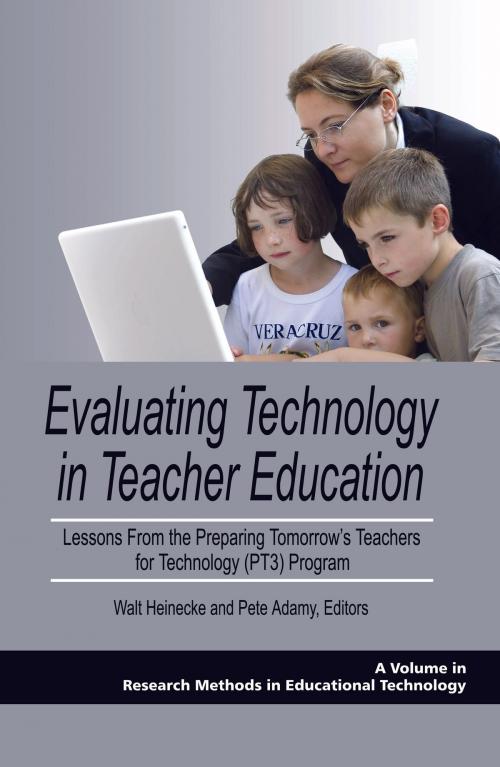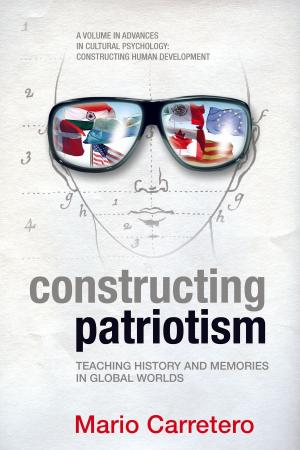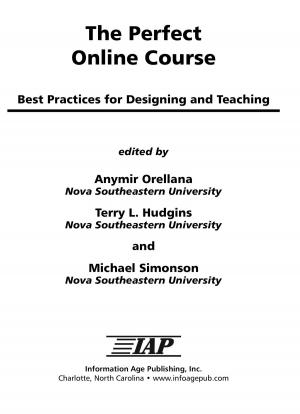Evaluating Technology in Teacher Education
Lessons From the Preparing Tomorrow’s Teachers for Technology (PT3) Program
Nonfiction, Reference & Language, Education & Teaching, Higher Education| Author: | ISBN: | 9781617350856 | |
| Publisher: | Information Age Publishing | Publication: | June 1, 2010 |
| Imprint: | Information Age Publishing | Language: | English |
| Author: | |
| ISBN: | 9781617350856 |
| Publisher: | Information Age Publishing |
| Publication: | June 1, 2010 |
| Imprint: | Information Age Publishing |
| Language: | English |
Overall we come away from this project with a renewed sense of the complexity of evaluating the implementation and impact of technology in teacher education. In the postPT3 period the federal government turned to largescale experimental and quasiexperimental evaluations of educational technology but these have produced little in the way of understanding what types of technology work in various content areas under various conditions. PT3 and its approach to evaluation can be viewed as the pioneering period of educational technology evaluation in teacher education. It was a time when evaluators were just beginning to develop appropriate standards that could be used as evaluation criteria. It was a time when the accumulated wisdom of the evaluation field with regards to the primacy of mixed methods and multiple indicators of outcomes was just beginning to take hold. PT3 evaluators understood the importance of treading the line between summative and formative evaluation, and the relationship of evaluation to the improvement of educational practice. In a world where the policymakers now clamor for simple quantitative evaluations linking teacher preparation to pupil achievement scores, we are reminded that the causal chain from teacher preparation to inservice performance and student achievement is fraught with externalities, complexities and a less than equal playing field. Collectively we still have not figured out how technology may be adding value to education beyond any potential impact on superficial standardized test scores. We have as a nation, ignored the call of cognitive psychologists who in 2000 called for a new frame of reference for learnercentered, communitycentered , assessmentcentered and contentcentered educational processes. They understood that the high stakes accountability systems hinder educational innovation and the release of technology's potential to unlock new ways of knowing and learning. Looking back now on the accomplishments of the PT3 program within our current political context, we see a need for more nuanced evaluation models that examine the relationship between pedagogy and technology integration, with a realization that teacher preparation programs will vary in their approaches to both. Some will focus on skillsbased approaches, others on the relationship between pedagogical content knowledge and technology integration. The PT3 program served as an important incubator and testbed of appropriate evaluation practice; we are already looking back at the program for lessons on how to move forward. We hope this volume may serve as a reminder of lessons for the future.
Overall we come away from this project with a renewed sense of the complexity of evaluating the implementation and impact of technology in teacher education. In the postPT3 period the federal government turned to largescale experimental and quasiexperimental evaluations of educational technology but these have produced little in the way of understanding what types of technology work in various content areas under various conditions. PT3 and its approach to evaluation can be viewed as the pioneering period of educational technology evaluation in teacher education. It was a time when evaluators were just beginning to develop appropriate standards that could be used as evaluation criteria. It was a time when the accumulated wisdom of the evaluation field with regards to the primacy of mixed methods and multiple indicators of outcomes was just beginning to take hold. PT3 evaluators understood the importance of treading the line between summative and formative evaluation, and the relationship of evaluation to the improvement of educational practice. In a world where the policymakers now clamor for simple quantitative evaluations linking teacher preparation to pupil achievement scores, we are reminded that the causal chain from teacher preparation to inservice performance and student achievement is fraught with externalities, complexities and a less than equal playing field. Collectively we still have not figured out how technology may be adding value to education beyond any potential impact on superficial standardized test scores. We have as a nation, ignored the call of cognitive psychologists who in 2000 called for a new frame of reference for learnercentered, communitycentered , assessmentcentered and contentcentered educational processes. They understood that the high stakes accountability systems hinder educational innovation and the release of technology's potential to unlock new ways of knowing and learning. Looking back now on the accomplishments of the PT3 program within our current political context, we see a need for more nuanced evaluation models that examine the relationship between pedagogy and technology integration, with a realization that teacher preparation programs will vary in their approaches to both. Some will focus on skillsbased approaches, others on the relationship between pedagogical content knowledge and technology integration. The PT3 program served as an important incubator and testbed of appropriate evaluation practice; we are already looking back at the program for lessons on how to move forward. We hope this volume may serve as a reminder of lessons for the future.















